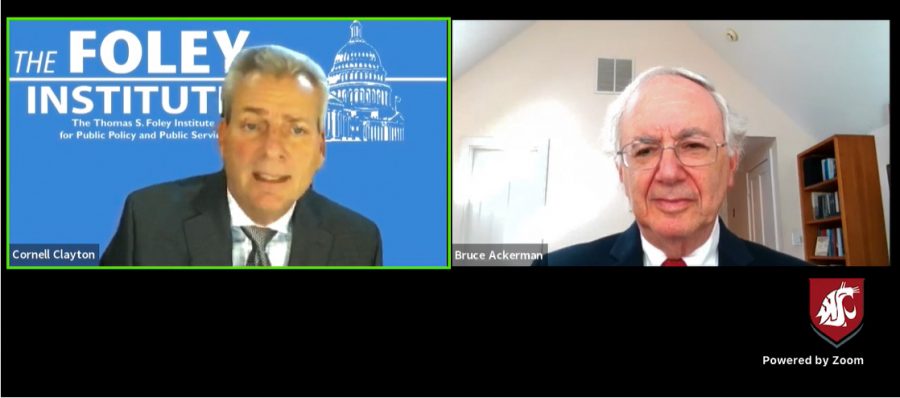Yale faculty member discusses Trump, Capitol riots
Foley Institute distinguished lecture series explores constitutional implications of 14th Amendment
Speaker Bruce Ackerman said he would not be surprised if Trump is voted to be disqualified from holding another office after the U.S. Capitol riots.
February 26, 2021
A constitutional law professor from Yale outlined the legal aspects of possibly banning former President Donald Trump from running for office again during a Foley Institute event Thursday.
Bruce Ackerman led the Foley talk titled “Is Trump the Symptom of a Constitutional Dis-Ease?” He has authored more than 19 books on political philosophy and constitutional law policy, said Cornell Clayton, director of WSU’s Thomas S. Foley Institute for Public Policy and Public Service.
Ackerman said Section 3 of the 14th Amendment states that if any U.S. government official engages in conspiracy involving an insurrection against the government, that person should be disqualified from serving in any future positions.
The exception is if a two-thirds vote in Congress passes to grant amnesty to the person in question, Ackerman said.
“They should not merely treat the Constitution as a piece of paper,” he said.
Ackerman said he would not be surprised if Trump is voted to be disqualified from holding another office after the U.S. Capitol riots.
Since World War II, there has not been a public event of insurrection like Jan. 6, he said.
In addition to the vote, the resolution Ackerman said he favors would advise the U.S. Attorney General to present all relevant evidence to the District of Columbia District Court. From there, the judges would determine if Trump engaged in the rebellion.
Ackerman said this process would be beneficial because the Attorney General could subpoena several documents without executive privilege protecting Trump. This would not be a criminal proceeding, it would only determine if Trump could run in other elections.
“We do know that if the representatives of the American people in the House and in the Senate have concluded that this kind of push, seizure of power is illegitimate and should not happen again, then this will be a landmark precedent,” he said.
Griffin Grubb, WSU student and intern at the Foley Institute, asked if Congress could start the same process of disqualification for other senators who allegedly aided the insurrection, like Senator Josh Hawley.
Ackerman said one of Senator Hawley’s opponents could bring a lawsuit against him challenging his participation in the riots under the Ku Klux Klan Act of 1871.
“I think it’s a fair question for the Democratic majority,” he said. “How much time and energy should they invest in returning to this terrible tragedy as opposed to doing what they want to do in response to the economic crisis response or climate change?”









